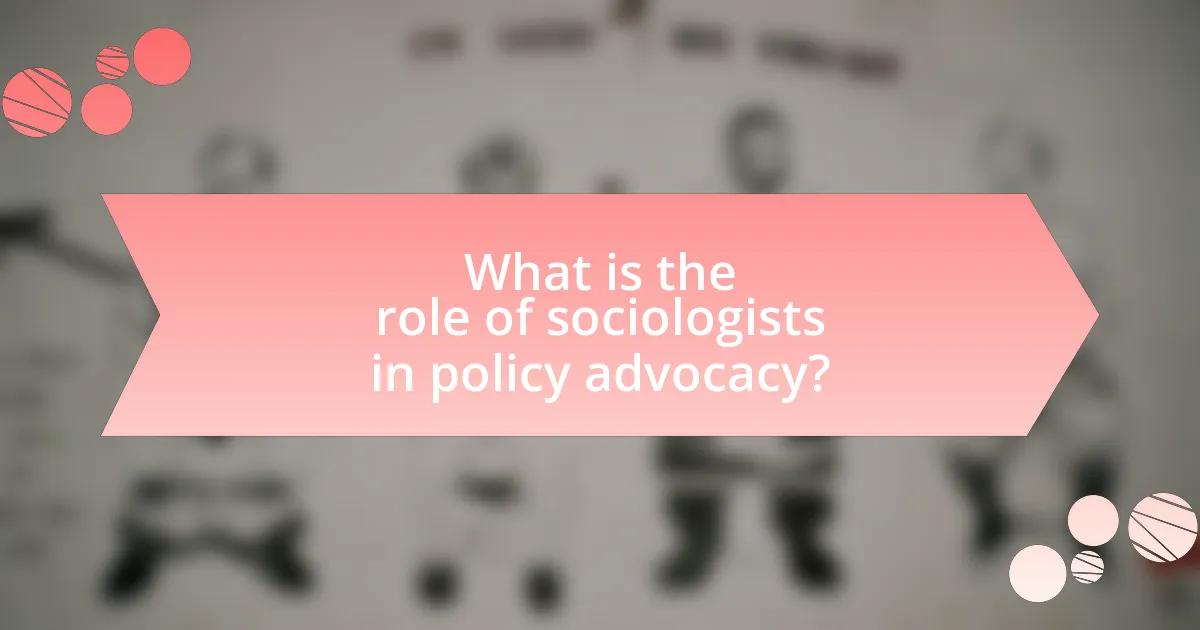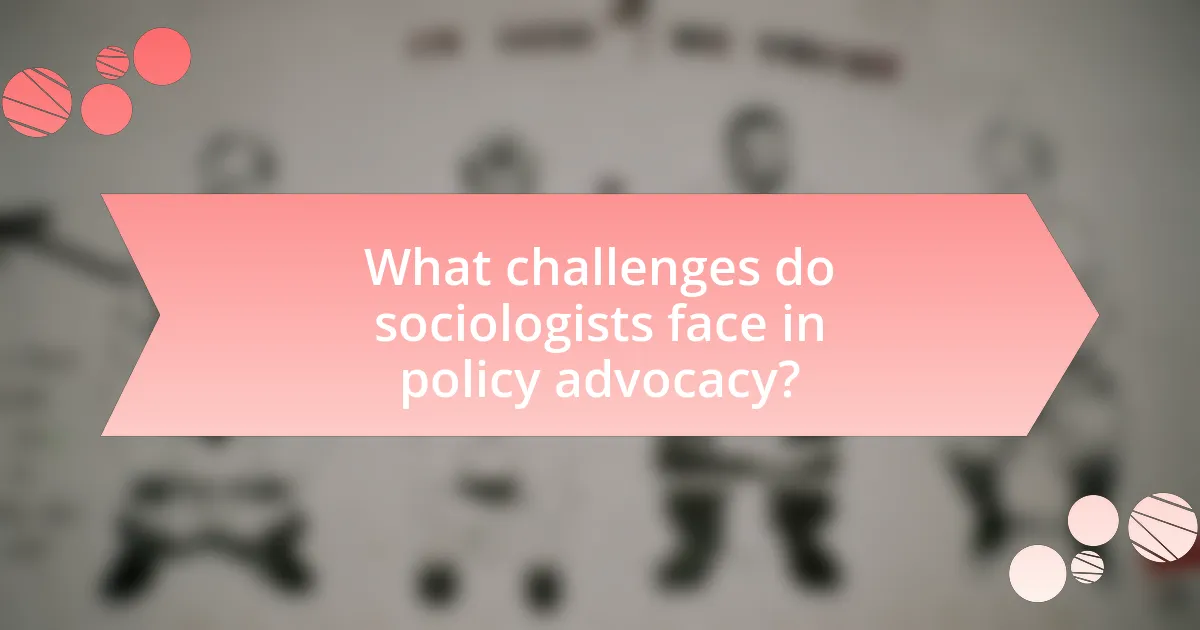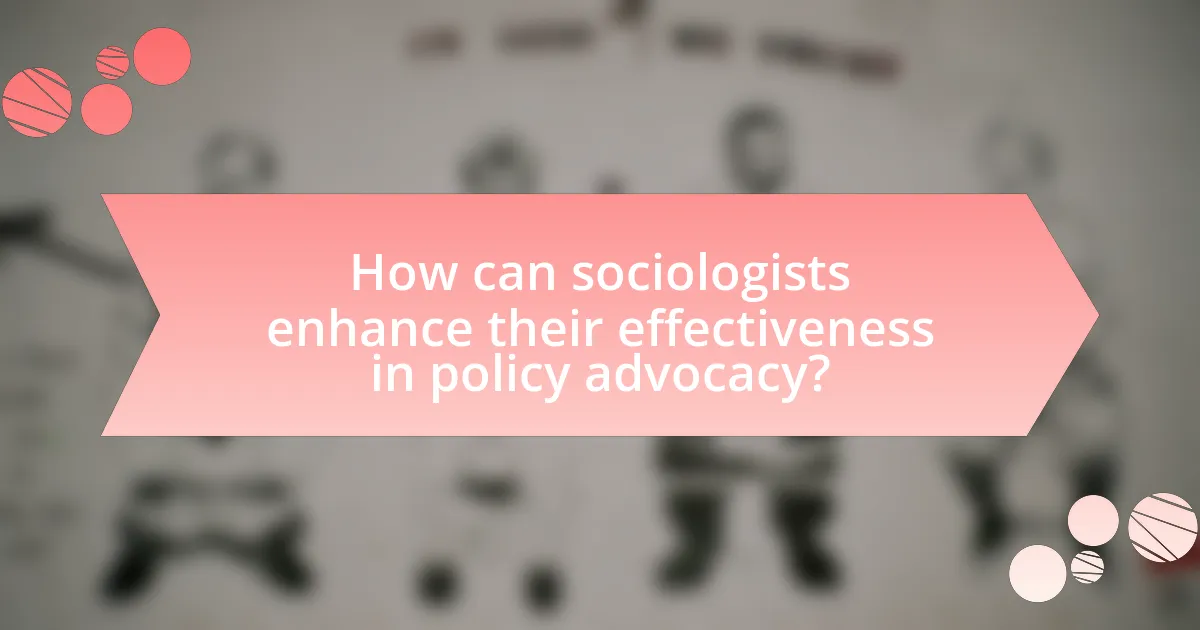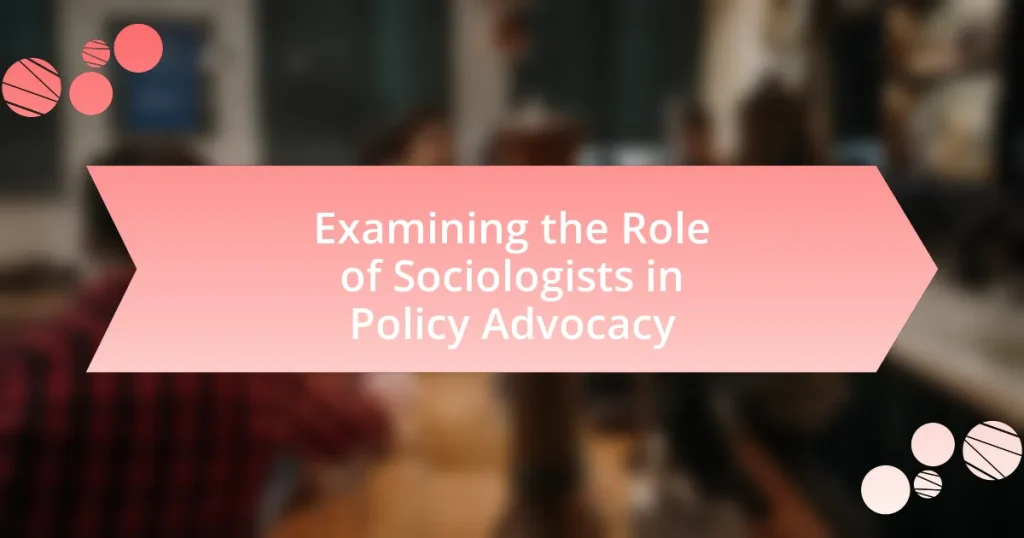The article examines the critical role of sociologists in policy advocacy, highlighting how their empirical research and sociological insights inform public policies. It discusses the methodologies sociologists use, such as qualitative and quantitative research, to analyze social issues and assess the impact of policies on communities. The article also addresses the challenges sociologists face in influencing policy, the importance of their involvement in the policy-making process, and the ethical considerations they must uphold. Additionally, it outlines strategies for effective communication and collaboration with policymakers, emphasizing the need for transparency and community engagement in advocacy efforts.

What is the role of sociologists in policy advocacy?
Sociologists play a crucial role in policy advocacy by providing empirical research and sociological insights that inform and shape public policies. They analyze social issues, identify patterns, and assess the impact of policies on different communities, which helps policymakers understand the social context of their decisions. For instance, sociologists have contributed to the development of policies addressing inequality by highlighting systemic factors that perpetuate disparities. Their research often includes data collection and analysis, which can reveal the effectiveness of existing policies and suggest evidence-based alternatives. This evidence-based approach is essential for creating policies that are not only effective but also equitable, as demonstrated by studies linking sociological research to successful interventions in areas like education and healthcare.
How do sociologists contribute to the policy-making process?
Sociologists contribute to the policy-making process by providing empirical research and analysis that inform decision-makers about social issues and their implications. Their studies often reveal patterns in social behavior, inequality, and community needs, which can guide the development of effective policies. For instance, sociologists have conducted extensive research on the impacts of poverty and education on social mobility, influencing policies aimed at reducing educational disparities. This evidence-based approach ensures that policies are grounded in real-world data, enhancing their effectiveness and relevance.
What methodologies do sociologists use in their advocacy efforts?
Sociologists employ various methodologies in their advocacy efforts, including qualitative research, quantitative analysis, and participatory action research. Qualitative research methods, such as interviews and focus groups, allow sociologists to gather in-depth insights into social issues and the experiences of marginalized communities. Quantitative analysis, utilizing surveys and statistical data, enables sociologists to identify trends and measure the impact of policies. Participatory action research involves collaboration with community members to address social problems, ensuring that advocacy efforts are grounded in the lived experiences of those affected. These methodologies collectively enhance the effectiveness of sociologists in influencing policy and driving social change.
How do sociologists gather and analyze data for policy recommendations?
Sociologists gather and analyze data for policy recommendations through a combination of qualitative and quantitative research methods. They employ surveys, interviews, focus groups, and observational studies to collect data on social behaviors, attitudes, and conditions. For instance, the American Sociological Association highlights that sociologists often use statistical analysis to interpret survey data, allowing them to identify trends and correlations that inform policy decisions. Additionally, case studies provide in-depth insights into specific social issues, enabling sociologists to recommend targeted interventions. This methodological diversity ensures that their policy recommendations are grounded in empirical evidence and reflect the complexities of social phenomena.
Why is the involvement of sociologists important in policy advocacy?
The involvement of sociologists is important in policy advocacy because they provide critical insights into social behaviors, structures, and inequalities that inform effective policy-making. Sociologists utilize empirical research methods to analyze societal issues, enabling them to identify the root causes of problems and propose evidence-based solutions. For instance, studies have shown that sociological research can reveal disparities in health care access, which can lead to more equitable health policies. Their expertise in understanding social dynamics ensures that policies are not only effective but also socially just, ultimately leading to better outcomes for communities.
What unique perspectives do sociologists bring to policy discussions?
Sociologists bring a unique perspective to policy discussions by emphasizing the social context and structural factors that influence human behavior and societal issues. Their expertise allows for a deeper understanding of how policies affect different communities, highlighting inequalities and social dynamics that may not be immediately apparent. For instance, sociologists utilize empirical research methods to analyze data on social trends, such as poverty rates or educational disparities, providing evidence-based insights that inform policy decisions. This focus on social structures and relationships enables policymakers to create more effective and equitable solutions that address the root causes of social problems rather than merely treating their symptoms.
How can sociological insights improve policy outcomes?
Sociological insights can improve policy outcomes by providing a deeper understanding of social behaviors, structures, and inequalities that influence public issues. By analyzing data on social interactions and community dynamics, sociologists can identify the root causes of problems, such as poverty or crime, leading to more effective and targeted interventions. For instance, research by the American Sociological Association shows that policies informed by sociological research, such as community-based programs addressing social determinants of health, have resulted in improved health outcomes and reduced disparities. This evidence demonstrates that integrating sociological perspectives into policy-making processes enhances the relevance and efficacy of policies, ultimately leading to better societal outcomes.

What challenges do sociologists face in policy advocacy?
Sociologists face several challenges in policy advocacy, primarily including the complexity of translating sociological research into actionable policy recommendations. This difficulty arises from the need to communicate nuanced social issues effectively to policymakers who may prioritize immediate economic or political concerns over sociological insights. Additionally, sociologists often encounter resistance from stakeholders who may have conflicting interests or ideologies, making it challenging to build consensus around proposed policies. Furthermore, the limited resources available for sociological research can hinder the ability to conduct comprehensive studies that inform policy decisions, as evidenced by the National Science Foundation’s reports indicating a decline in funding for social science research. These factors collectively impede the effectiveness of sociologists in influencing policy outcomes.
How do sociologists navigate political environments?
Sociologists navigate political environments by employing research-based evidence to inform policy discussions and advocate for social change. They analyze social structures, cultural norms, and power dynamics to understand the implications of policies on various communities. For instance, sociologists often utilize quantitative data from surveys and qualitative insights from interviews to present compelling arguments that highlight social issues, such as inequality or discrimination. This evidence-based approach allows them to engage with policymakers effectively, ensuring that sociological perspectives are integrated into legislative processes.
What barriers exist for sociologists in influencing policy?
Sociologists face several barriers in influencing policy, including a lack of access to decision-makers, limited funding for research, and the challenge of translating complex social data into actionable policy recommendations. Access to policymakers is often restricted, making it difficult for sociologists to present their findings directly to those in power. Additionally, funding constraints can limit the scope and scale of sociological research, hindering the ability to produce comprehensive studies that could inform policy. Furthermore, the complexity of sociological data can pose a challenge in effectively communicating insights to policymakers, who may prioritize straightforward solutions over nuanced analyses. These barriers collectively impede the ability of sociologists to impact policy effectively.
How do sociologists address opposition to their recommendations?
Sociologists address opposition to their recommendations by engaging in dialogue and presenting empirical evidence to support their claims. They often utilize research findings, case studies, and statistical data to demonstrate the effectiveness of their recommendations, thereby countering objections with factual information. For instance, sociologists may reference studies that highlight successful policy implementations in similar contexts, which can help to alleviate concerns and build credibility. By fostering open communication and providing clear, data-driven arguments, sociologists aim to bridge gaps between their recommendations and the concerns of stakeholders.
What ethical considerations must sociologists keep in mind?
Sociologists must prioritize informed consent, confidentiality, and the potential impact of their research on participants and communities. Informed consent ensures that participants understand the nature of the study and agree to participate voluntarily, which is crucial for ethical integrity. Confidentiality protects the identities and personal information of participants, fostering trust and encouraging honest responses. Additionally, sociologists must consider the broader implications of their findings, as research can influence public policy and societal norms, potentially leading to unintended consequences. These ethical considerations are supported by the American Sociological Association’s Code of Ethics, which emphasizes the responsibility of sociologists to conduct research that respects the dignity and welfare of individuals and groups.
How do sociologists ensure their advocacy is unbiased and equitable?
Sociologists ensure their advocacy is unbiased and equitable by employing rigorous research methodologies and adhering to ethical guidelines. They utilize diverse data sources, including qualitative and quantitative methods, to capture a comprehensive view of social issues, which helps mitigate personal biases. Furthermore, sociologists often engage in peer review processes and collaborate with community stakeholders to validate their findings and perspectives, ensuring that multiple viewpoints are represented. This approach is supported by the American Sociological Association’s Code of Ethics, which emphasizes the importance of objectivity and fairness in sociological research and advocacy.
What role does transparency play in sociological advocacy?
Transparency is crucial in sociological advocacy as it fosters trust and credibility between advocates and the communities they serve. When sociologists openly share their research methods, data sources, and findings, they enable stakeholders to critically assess the validity and reliability of the information presented. This openness not only enhances the legitimacy of the advocacy efforts but also encourages informed dialogue among policymakers, practitioners, and the public. For instance, studies have shown that transparency in research processes can lead to greater public engagement and support for social policies, as seen in the work of sociologists who have effectively communicated their findings on social inequalities.

How can sociologists enhance their effectiveness in policy advocacy?
Sociologists can enhance their effectiveness in policy advocacy by employing evidence-based research to inform policy decisions. By conducting rigorous studies that highlight social issues and their implications, sociologists provide data that policymakers can use to understand the needs of communities. For instance, research from the American Sociological Association indicates that sociological insights into social inequality can lead to more equitable policy outcomes. Additionally, sociologists can collaborate with stakeholders, including community organizations and policymakers, to ensure that their findings are translated into actionable policies. This collaborative approach not only amplifies their voice but also fosters trust and credibility in the advocacy process.
What skills are essential for sociologists in advocacy roles?
Essential skills for sociologists in advocacy roles include strong communication, analytical thinking, and research proficiency. Effective communication enables sociologists to articulate complex social issues clearly to diverse audiences, while analytical thinking allows them to assess social problems critically and develop evidence-based solutions. Research proficiency is crucial for gathering and interpreting data that supports advocacy efforts, ensuring that their arguments are grounded in empirical evidence. These skills collectively empower sociologists to influence policy decisions and drive social change effectively.
How can sociologists improve their communication strategies?
Sociologists can improve their communication strategies by utilizing clear, accessible language and engaging storytelling techniques. By avoiding jargon and complex terminology, sociologists can make their research findings more understandable to a broader audience, including policymakers and the general public. Research indicates that effective communication enhances public engagement and policy impact; for instance, a study published in the “American Journal of Sociology” found that sociologists who employed narrative methods in their presentations were more successful in influencing policy discussions. Additionally, leveraging digital platforms and social media can expand their reach and facilitate real-time interaction with diverse audiences, further enhancing the effectiveness of their communication efforts.
What networking opportunities should sociologists pursue?
Sociologists should pursue networking opportunities through professional associations, academic conferences, and interdisciplinary collaborations. Engaging with organizations such as the American Sociological Association provides access to a vast network of professionals and resources. Attending conferences like the Annual Meeting of the American Sociological Association allows sociologists to present research, exchange ideas, and connect with policymakers. Additionally, collaborating with professionals from fields such as public policy, economics, and public health can enhance sociologists’ influence in advocacy efforts, as interdisciplinary approaches often yield more comprehensive solutions to social issues.
What best practices can sociologists adopt for successful advocacy?
Sociologists can adopt several best practices for successful advocacy, including building coalitions, utilizing data effectively, and engaging in public communication. Building coalitions with community organizations enhances the reach and impact of advocacy efforts, as demonstrated by the collaboration between sociologists and grassroots movements that has led to significant policy changes in areas like housing and education. Utilizing data effectively involves presenting empirical research to support claims, which can influence policymakers; for instance, studies showing the correlation between socioeconomic status and educational outcomes have prompted reforms in funding allocation. Engaging in public communication through social media and public forums allows sociologists to disseminate their findings and mobilize public support, as seen in campaigns that have successfully raised awareness about social issues like racial inequality.
How can sociologists effectively collaborate with policymakers?
Sociologists can effectively collaborate with policymakers by engaging in evidence-based research that informs policy decisions. This collaboration can be achieved through the provision of empirical data and sociological insights that highlight social issues, trends, and the impacts of potential policies. For instance, sociologists can conduct studies that reveal the effects of socioeconomic factors on public health, which can guide policymakers in creating targeted health interventions. Research by the American Sociological Association indicates that when sociologists present their findings in accessible formats, such as policy briefs or workshops, they enhance the likelihood of their research being utilized in policymaking processes.
What strategies can sociologists use to engage the public in advocacy efforts?
Sociologists can engage the public in advocacy efforts by utilizing community-based participatory research (CBPR) strategies. CBPR involves collaborating with community members to identify issues, collect data, and develop solutions, thereby fostering a sense of ownership and empowerment among participants. This approach has been shown to enhance public involvement and ensure that advocacy efforts are grounded in the lived experiences of the community, as evidenced by studies indicating that CBPR leads to more effective and sustainable interventions (Israel et al., 1998). Additionally, sociologists can leverage social media platforms to disseminate research findings and mobilize public support, as these platforms facilitate rapid information sharing and community engagement.
What resources are available for sociologists in policy advocacy?
Sociologists have access to various resources for policy advocacy, including academic journals, professional associations, and data repositories. Academic journals such as the “American Sociological Review” provide research findings that inform policy decisions. Professional associations like the American Sociological Association offer networking opportunities, advocacy training, and resources for engaging with policymakers. Additionally, data repositories such as the Inter-university Consortium for Political and Social Research (ICPSR) provide sociologists with access to extensive datasets that can support evidence-based advocacy efforts. These resources collectively enhance the ability of sociologists to influence policy effectively.
Which organizations support sociologists in their advocacy work?
Several organizations support sociologists in their advocacy work, including the American Sociological Association (ASA), the Society for the Study of Social Problems (SSSP), and the National Association of Social Workers (NASW). The ASA provides resources, networking opportunities, and platforms for sociologists to engage in policy discussions, while the SSSP focuses on social justice issues and promotes research that informs public policy. The NASW advocates for social work professionals, including sociologists, by influencing legislation and promoting social welfare policies. These organizations collectively enhance the capacity of sociologists to contribute effectively to advocacy efforts.
What tools can sociologists utilize for effective data presentation?
Sociologists can utilize various tools for effective data presentation, including statistical software, data visualization platforms, and qualitative analysis tools. Statistical software like SPSS and R allows sociologists to analyze complex datasets and generate descriptive statistics, which are essential for understanding social trends. Data visualization platforms such as Tableau and Microsoft Power BI enable the creation of interactive graphs and charts, making it easier to communicate findings to diverse audiences. Qualitative analysis tools like NVivo assist in organizing and interpreting qualitative data, enhancing the clarity of sociological insights. These tools collectively enhance the ability of sociologists to present data in a compelling and accessible manner, thereby supporting their role in policy advocacy.
